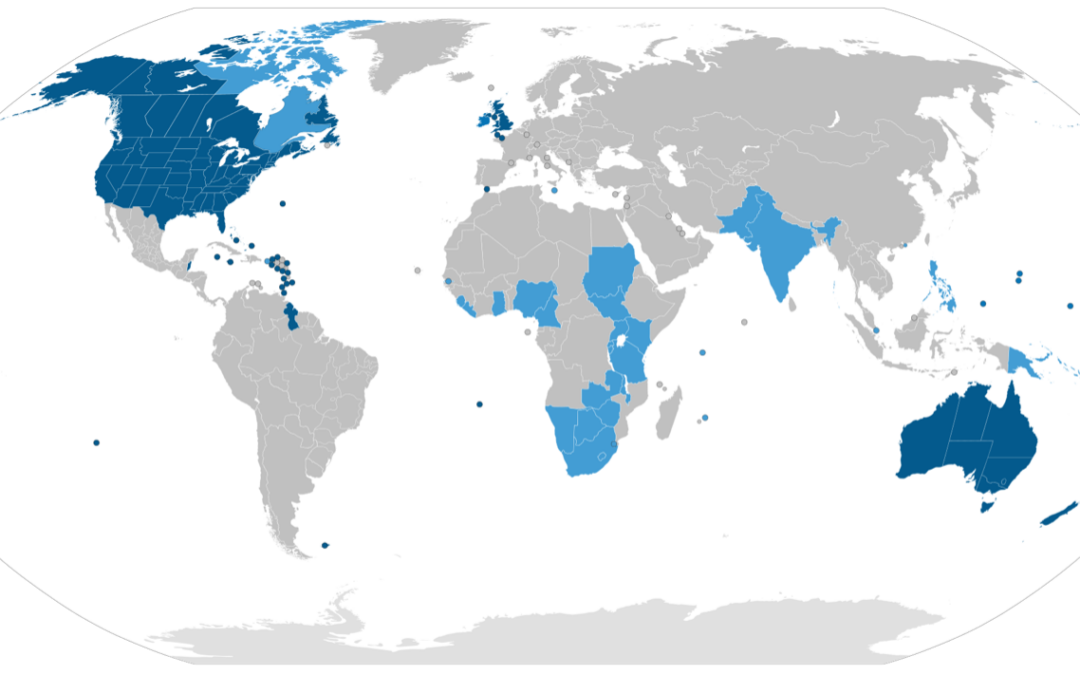In Africa, around 237 million people are English speakers. The spread of the English language in Africa as a second language was the result of the colonisation and incorporation of many African countries into the British Empire. The language was taught in missionary schools but was mostly taught to the upper classes who had access to higher levels of education in the colonised African countries. After African states gained independence in the late twentieth century, English continued to be taught within the education system and spread more widely within the rest of the population as opposed to just a small elite. English is the main language used in class in primary and secondary school in many African countries. In fact, nearly every sub-Saharan African country uses a colonial language as the language of instruction in its education system, except for Ethiopia, Eritrea, and Tanzania.
Anglophone countries in Africa
English is an official language and language most widely used in business in at least 23 different countries in the African continent, and these countries are referred to as Anglophone countries. In West Africa (Gambia, Sierra Leone, Liberia, Ghana, Nigeria, and Cameroon) there are six countries which are regarded as being Anglophone countries, eight in the South (South Africa, Namibia, Botswana, Lesotho, Zimbabwe, Zambia, Malawi and Swaziland) and six in the East of Africa (Uganda, Kenya, Tanzania, Sudan and South Sudan), one in Central Africa (Rwanda), one in North Africa (Eritrea) as well as the islands of the Seychelles and Mauritius.
The largest number of English speakers in Africa are located in Nigeria, where it is estimated that 111 million people speak the language. Other countries in Africa with a significant number of English speakers are Uganda (29 million), South Africa (16 million) and Cameroon (9.8 million). Politically, in Africa, the English language is seen as being very important in the context of the global stage, as it is the official working language of many international political and economic gatherings, being called “the global language of business” by the Harvard Business Review. In addition to use in business and commerce, English is also a significant language in the anglophone countries, as it is also used in the print and broadcast media, national parliaments, as well as being the language used in courts and the administration sector.
English proficiency in the Anglophone countries
According to the EF English Proficiency Index, South Africa, with an EF EPI score of 607, was ranked 12th of 100 countries in the world as a country with a “very high proficiency of the English language. Other highly ranked countries in the African Anglophone countries were Kenya (ranked 22nd, with a “high” proficiency) and Nigeria (ranked 34th, with a “moderate” proficiency). The higher ranked countries are also three of the largest economies in the African continent. In a historical context, the countries with the highest English proficiency are those that were former colonies of the British Empire, so as a result have retained the English language as an official language since their independence from the British Empire, compared to lower ranked countries such as Algeria and Egypt where Arabic is the official language, or the Ivory Coast, which is a Francophone country. However, the lowest ranked Anglophone countries were Cameroon (ranked 89th, with an EF EPI score of 419) and Sudan (ranked 85th, with an EF EPI score of 434).
Despite the high levels of proficiency in South Africa and Nigeria, both countries are required to take the IELTS exam, an English proficiency exam taken by those wanting to study in an English-speaking environment or university. According to the UK Government, nationals from Australia, Canada, New Zealand, the USA, as well as countries from the Caribbean Islands (such as Jamaica, Belize, Trinidad, and Tobago) are exempt from taking the IELTS exams. However, some universities in the UK accept the WASSCE (West African Senior School Certificate), a Higher National Diploma, KCSE (Kenyan Certificate of Secondary Education), GSSSC (Ghanian Senior Secondary School Certificate), or the NSC (South African National Senior Certificate) in place of the IELTS exams as proof of proficiency in the English Language. Students from North African countries, such as Egypt or Sudan, are required to take the IELTS Academic exam as the qualifications from their home countries are not accepted as proof of skill in the English language.
In conclusion
While there are many different languages across the African continent, it is important to recognise that a significant number of people speak the English language in Africa, as well as the fact that many people live in Anglophone countries in Africa. English plays a large role in the business and commerce, media as well as the education in many of the Anglophone countries and gives international students the opportunity to access higher education in a different country. If you require translation or interpreting services from English to any of the many different languages in the African continent (Arabic, Swahili, Yoruba), or any other language, you can get a quote here from Crystal Clear Translation.


